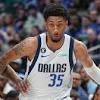Who's slowing Luka Dončić down: the Celtics or himself?


Ric Bucher
FOX Sports NBA Analyst
Luka Dončić fought the law — and the law won.
If there was a reason to believe the Dallas Mavericks could beat the Boston Celtics for the 2024 NBA title despite Boston's sizable advantage in Finals experience, it was Luka Dončić and his proven ability to respond in pressure situations with his best, utilizing an old-school array of skills and tactics to get to wherever he wanted to on the floor and make whatever play was necessary. Wise beyond his years was a standard way of describing Dončić's game, which landed him on his first All-Star team while still a teenager and his first all-NBA team before he was legal to drink.
His competitive fire was old school, too, as he alternately grinned and sneered and mf-ed anyone who showed the slightest doubt that he would come through in the clutch. His confidence, bordering on arrogance, seemed justified. No matter what kind of defense he faced, he figured out how to unlock it, whether it was with improbable shot-making or pinpoint passing. It might take him a quarter or maybe even a full game, but eventually, whatever question a team's defense posed, he'd find an answer. In almost every instance, if Dončić or the Mavs didn't win, it was because they couldn't stop the other team, not because they were easily stopped.
This year's run appeared to be when he would bring home the biggest prize of all — a championship — and vault himself into both the best-player and face-of-the-league conversations.
After all, here he was, at 25 years old, the undisputed leader of a team that had taken down the Western Conference's No. 1 seed, the Oklahoma City Thunder, and then the league's No. 1 defense, the Minnesota Timberwolves.
What chance did the Celtics and their well-earned reputation as post-season choke artists have against Cool Hand Luka?
Welp — from what we've seen through three games, a terrific chance. Largely because they've found a way to frustrate Luka in a way that no opponent has before. In Game 1 he had a very un-Dončić-like single assist and four turnovers as the Celtics enjoyed a run-away victory. In Game 2, he had a triple-double with 32 points, 11 rebounds and 11 assists, but he also had eight turnovers, at least half of them live-ball ones that led to Boston fast breaks and swings in momentum. Combined with his poor free-throw shooting (4-for-8), it killed a Dallas chance to even the series at 1-1 before heading home.
But Game 3 may have been his worst performance yet. He needed 27 shots to score 27 points and had as many turnovers as assists (3) through the first three quarters. He would pick up three more assists in the late 20-2 burst but contributed only two points, missing 4 of 5 shots as he appeared to be more focused on drawing contact and a whistle than actually making the shot.
All of this has transpired as the Celtics have selectively double-teamed him, allowing him to find his way into the paint before forcing him to play in a crowd. Far too many times in his attempt to draw a foul Wednesday night, Dončić fell to the floor and raised his hands in disbelief over not getting a call while the Celtics raced the other way for a 5-on-4 opportunity.
Dončić has indulged such behavior at various times over the course of his career, but never so consistently — or at the expense of giving himself a chance to be on the floor to make the necessary plays to win the game.
But that's exactly what happened Wednesday night.
With the Game 3 outcome — and a chance to revive Dallas' hopes of winning the series — hanging in the balance, Dončić left it up to the discretion of the referees to decide if he could play the final four minutes, 12 seconds. The Mavericks had appeared dead in the water, Boston taking a 21-point lead on back-to-back threes with a few ticks over 11 minutes to play, until a furious 20-2 Mavs' run raised the specter of another epic Celtic collapse.
After three free throws by Kyrie Irving trimmed the Boston lead to 93-90, the two teams spent the next two minutes trading empty possessions and missed shots until a missed pull-up jumper by Irving led to Brown's fastbreak opportunity. Dončić met him just wide of the free-throw line and fell on his backside as the two collided, referee Kevin Scott tapping his elbows on his hips, signaling a blocking foul on Dončić.
Mavs coach Jason Kidd took a timeout to challenge the call, but crew chief Marc Davis, after studying the replay, upheld Scott's call and Dončić sat down on the bench, shaking his head. Irving would score with a pull-up 18-foot jumper on Dallas' next possession to narrow the difference to a one-point lead, but that was as close as it got. A combination of collective, frenetic defense, led by Jrue Holiday on Irving, and a triple-headed scoring threat of Brown, Derrick White and Jayson Tatum, proved to be too much for what was now a single charging Maverick.
The decision to put his availability in the hands of the referees was hardly Dončić's first questionable decision of the night, especially in light of how the night had gone for him with the officials to that point. His last foul on Brown was his fourth in the fourth quarter and the second in a span of 26 seconds involving Brown. On Boston's previous possession, the two also fell to the floor, nearly in the same spot, when the two tangled as Brown attempted to spin around Dončić in the post, Scott blowing the whistle on that one as well.
Dončić and the Mavericks now face the challenge of simply avoiding a sweep. Considering that they've put themselves in position in all three games to have the outcome decided in crunch time — the time in the game that they were supposed to have a decided advantage with the reputations for making clutch shots that both Dončić and Irving have — it's not unreasonable to think they're capable of forcing the series back to Boston. But for that to happen, Dončić has to focus on one, and only one, opponent.
The one wearing shorts. Not whistles.
Ric Bucher is an NBA writer for FOX Sports. He previously wrote for Bleacher Report, ESPN The Magazine and The Washington Post and has written two books, "Rebound," on NBA forward Brian Grant's battle with young onset Parkinson's, and "Yao: A Life In Two Worlds." He also has a daily podcast, "On The Ball with Ric Bucher." Follow him on Twitter @RicBucher.
recommended



 United States
United States Argentina
Argentina  Australia
Australia  Austria
Austria  Brazil
Brazil  Canada
Canada  Chile
Chile  Czechia
Czechia  France
France  Germany
Germany  Greece
Greece  Italy
Italy  Mexico
Mexico  New Zealand
New Zealand  Nigeria
Nigeria  Norway
Norway  Poland
Poland  Portugal
Portugal  Sweden
Sweden  Switzerland
Switzerland  United Kingdom
United Kingdom 
























